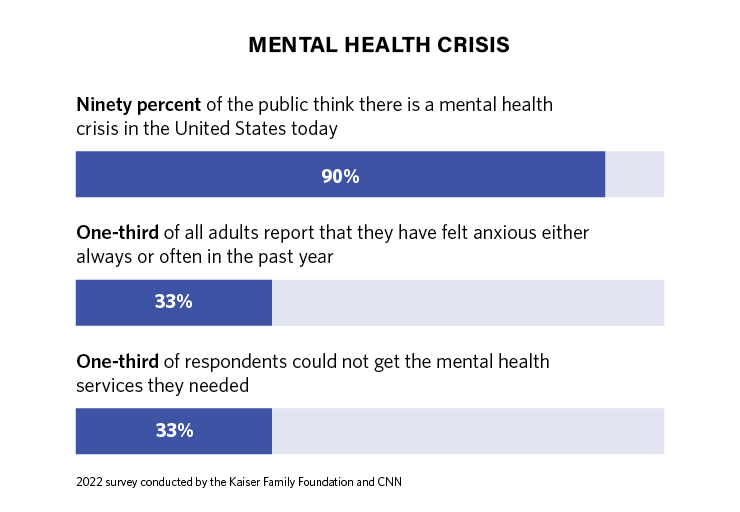Creating a healthy system of mental health diagnosis and treatment, more than ever, is essential to health and wellness in this country. With suicide as the second leading cause of death among young people, along with record rates of depression and anxiety, rising overdose deaths and substance abuse, it is clear that access to mental healthcare is a critical need like never before.
American’s self-reported physical and mental health levels are trending down. A 2024 national survey The burgeoning population of individuals with mental illness overwhelming our cities’ streets is a visual reminder and a measure of this growing crisis and the unmet needs of this population. The average delay between onset of mental illness symptoms and treatment is 11 years. There is a shortfall in available services and a lack of resources, so expansion in this field is clearly needed. But could awareness be as much of an issue as availability? There are exceptional mental health providers already in place who are innovating new treatment models and offering levels of access never before available. But reaching the people most in need of care is one of the greatest challenges in providing mental health services. Opening avenues of access for individuals and families in crisis is critical, but how does that happen without first building awareness of the services available? That’s where healthcare marketing takes on an essential role as a tool in mental health delivery – because the people who need available mental health resources are often the very people who are least aware of what is actually available to them. Bridging that awareness gap is the first step. Not only can mental health marketing build awareness about the services available, but it can serve another important role: mental health education. Oftentimes, people first resonate with something they see in a video, digital ad or social media post before they can even put a name to it in their own lives. A problem needs to be recognized before it can be addressed. At the heart of effective mental health marketing is exceptional messaging that resonates with individuals and families in need of mental health services – messaging designed to help consumers of mental healthcare understand what they are experiencing and how to access appropriate care. Funding for most mental health services often includes funding for education and awareness-building, which can be accomplished by high-quality strategic marketing campaigns. Mental health providers who understand the role healthcare marketing can play in building awareness often are the ones who use their funding to its best effect. Our modern-day marketing landscape is ideal for accomplishing this. Today’s digital advertising content can be targeted to populations eligible for specific services. Social media, digital advertising and paid search are all effective approaches to drive awareness and create engagement. Research suggests that the average patient will google their condition over 30 times before even entering the healthcare system where they eventually land. Dr. Google has become the frontline of healthcare for most Americans. Google’s total daily health-related searches amount to 70,000 each minute. How much more so is this true in the arena of mental health, where there is so much stigma and shame surrounding mental health conditions? It’s much less intimidating to tell Google, “I’ve been thinking about suicide,” or “I’ve been hearing voices,” than to tell your husband, wife, mother, father, boss, teacher, or friend – or even your doctor. The American Psychological Association has curated many helpful tools and information for understanding, assessing and addressing conditions like anxiety, depression, post-traumatic stress disorder and ADHD. The time to connect people to reliable mental health resources is right now – a fact that is underscored by these survey findings: The stakes, increasingly, are just too high for anything less than smart marketing that creates bridges to effective care, when and where it is needed. When somebody searches online, it’s important that they find high-quality mental healthcare and support – as well as direction on where the right mental health intervention can be found. In mental health, marketing can be an integral part of the mission. At Practis, we encourage our clients who are mental healthcare providers to tout their quality measures as a guide that helps people find the best care. Designing a mental health marketing strategy that is “more than marketing” is key to what we do for our clients in this field – because building awareness is the first step on the path to creating mental wellness.

